Entrepreneurship: Ventures, Economic Impact & Successful Examples
VerifiedAdded on 2023/01/04
|18
|5713
|26
Report
AI Summary
This report provides a comprehensive analysis of entrepreneurship and small businesses, focusing on different types of entrepreneurial ventures, their relationship with entrepreneurship typologies, and their similarities and differences. It examines the impact of micro and small businesses on the economy, particularly in the UK, highlighting their role in wealth creation, job creation, regional development, and GDP contribution. The report also discusses the characteristics, traits, and skills that differentiate entrepreneurs from managers, and how entrepreneurial personality reflects motivation and mindset. Furthermore, it presents examples of successful entrepreneurs, providing insights into their backgrounds and experiences. Desklib offers a platform with similar solved assignments and study tools for students.

Entrepreneurship & Small
Business
Business
Paraphrase This Document
Need a fresh take? Get an instant paraphrase of this document with our AI Paraphraser

Table of Contents
INTRODUCTION...........................................................................................................................1
TASK1.............................................................................................................................................1
P1: Describe different types of entrepreneurial ventures and their relation with typologies of
entrepreneurship..........................................................................................................................1
P2: Determine entrepreneur ventures similarities and differences.............................................3
TASK2.............................................................................................................................................5
P3: Define impact of micro and small business on economy.....................................................5
P4: Explain the importance of small business in social economic growth.................................7
P5: Determine the characteristic, trait and skill of entrepreneurs that differentiate them from
manager.......................................................................................................................................8
P6: Assess how aspects of the entrepreneurial aspects personality reflect entrepreneurial
motivation and mindset.............................................................................................................11
TASK4...........................................................................................................................................12
P7: State suitable examples for successful entrepreneurs with background and experience....12
CONCLUSION..............................................................................................................................13
REFERENCES..............................................................................................................................15
INTRODUCTION...........................................................................................................................1
TASK1.............................................................................................................................................1
P1: Describe different types of entrepreneurial ventures and their relation with typologies of
entrepreneurship..........................................................................................................................1
P2: Determine entrepreneur ventures similarities and differences.............................................3
TASK2.............................................................................................................................................5
P3: Define impact of micro and small business on economy.....................................................5
P4: Explain the importance of small business in social economic growth.................................7
P5: Determine the characteristic, trait and skill of entrepreneurs that differentiate them from
manager.......................................................................................................................................8
P6: Assess how aspects of the entrepreneurial aspects personality reflect entrepreneurial
motivation and mindset.............................................................................................................11
TASK4...........................................................................................................................................12
P7: State suitable examples for successful entrepreneurs with background and experience....12
CONCLUSION..............................................................................................................................13
REFERENCES..............................................................................................................................15
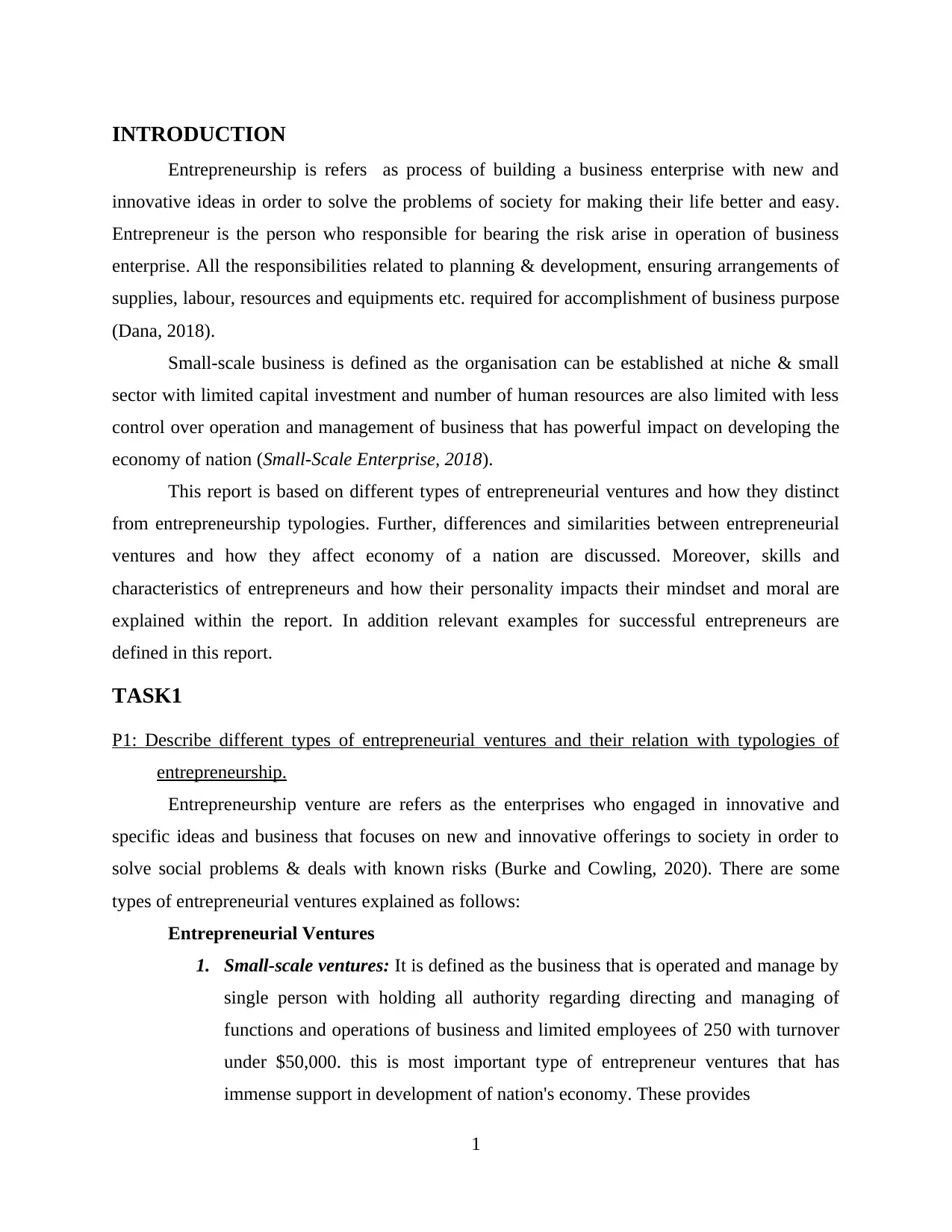
INTRODUCTION
Entrepreneurship is refers as process of building a business enterprise with new and
innovative ideas in order to solve the problems of society for making their life better and easy.
Entrepreneur is the person who responsible for bearing the risk arise in operation of business
enterprise. All the responsibilities related to planning & development, ensuring arrangements of
supplies, labour, resources and equipments etc. required for accomplishment of business purpose
(Dana, 2018).
Small-scale business is defined as the organisation can be established at niche & small
sector with limited capital investment and number of human resources are also limited with less
control over operation and management of business that has powerful impact on developing the
economy of nation (Small-Scale Enterprise, 2018).
This report is based on different types of entrepreneurial ventures and how they distinct
from entrepreneurship typologies. Further, differences and similarities between entrepreneurial
ventures and how they affect economy of a nation are discussed. Moreover, skills and
characteristics of entrepreneurs and how their personality impacts their mindset and moral are
explained within the report. In addition relevant examples for successful entrepreneurs are
defined in this report.
TASK1
P1: Describe different types of entrepreneurial ventures and their relation with typologies of
entrepreneurship.
Entrepreneurship venture are refers as the enterprises who engaged in innovative and
specific ideas and business that focuses on new and innovative offerings to society in order to
solve social problems & deals with known risks (Burke and Cowling, 2020). There are some
types of entrepreneurial ventures explained as follows:
Entrepreneurial Ventures
1. Small-scale ventures: It is defined as the business that is operated and manage by
single person with holding all authority regarding directing and managing of
functions and operations of business and limited employees of 250 with turnover
under $50,000. this is most important type of entrepreneur ventures that has
immense support in development of nation's economy. These provides
1
Entrepreneurship is refers as process of building a business enterprise with new and
innovative ideas in order to solve the problems of society for making their life better and easy.
Entrepreneur is the person who responsible for bearing the risk arise in operation of business
enterprise. All the responsibilities related to planning & development, ensuring arrangements of
supplies, labour, resources and equipments etc. required for accomplishment of business purpose
(Dana, 2018).
Small-scale business is defined as the organisation can be established at niche & small
sector with limited capital investment and number of human resources are also limited with less
control over operation and management of business that has powerful impact on developing the
economy of nation (Small-Scale Enterprise, 2018).
This report is based on different types of entrepreneurial ventures and how they distinct
from entrepreneurship typologies. Further, differences and similarities between entrepreneurial
ventures and how they affect economy of a nation are discussed. Moreover, skills and
characteristics of entrepreneurs and how their personality impacts their mindset and moral are
explained within the report. In addition relevant examples for successful entrepreneurs are
defined in this report.
TASK1
P1: Describe different types of entrepreneurial ventures and their relation with typologies of
entrepreneurship.
Entrepreneurship venture are refers as the enterprises who engaged in innovative and
specific ideas and business that focuses on new and innovative offerings to society in order to
solve social problems & deals with known risks (Burke and Cowling, 2020). There are some
types of entrepreneurial ventures explained as follows:
Entrepreneurial Ventures
1. Small-scale ventures: It is defined as the business that is operated and manage by
single person with holding all authority regarding directing and managing of
functions and operations of business and limited employees of 250 with turnover
under $50,000. this is most important type of entrepreneur ventures that has
immense support in development of nation's economy. These provides
1
⊘ This is a preview!⊘
Do you want full access?
Subscribe today to unlock all pages.

Trusted by 1+ million students worldwide
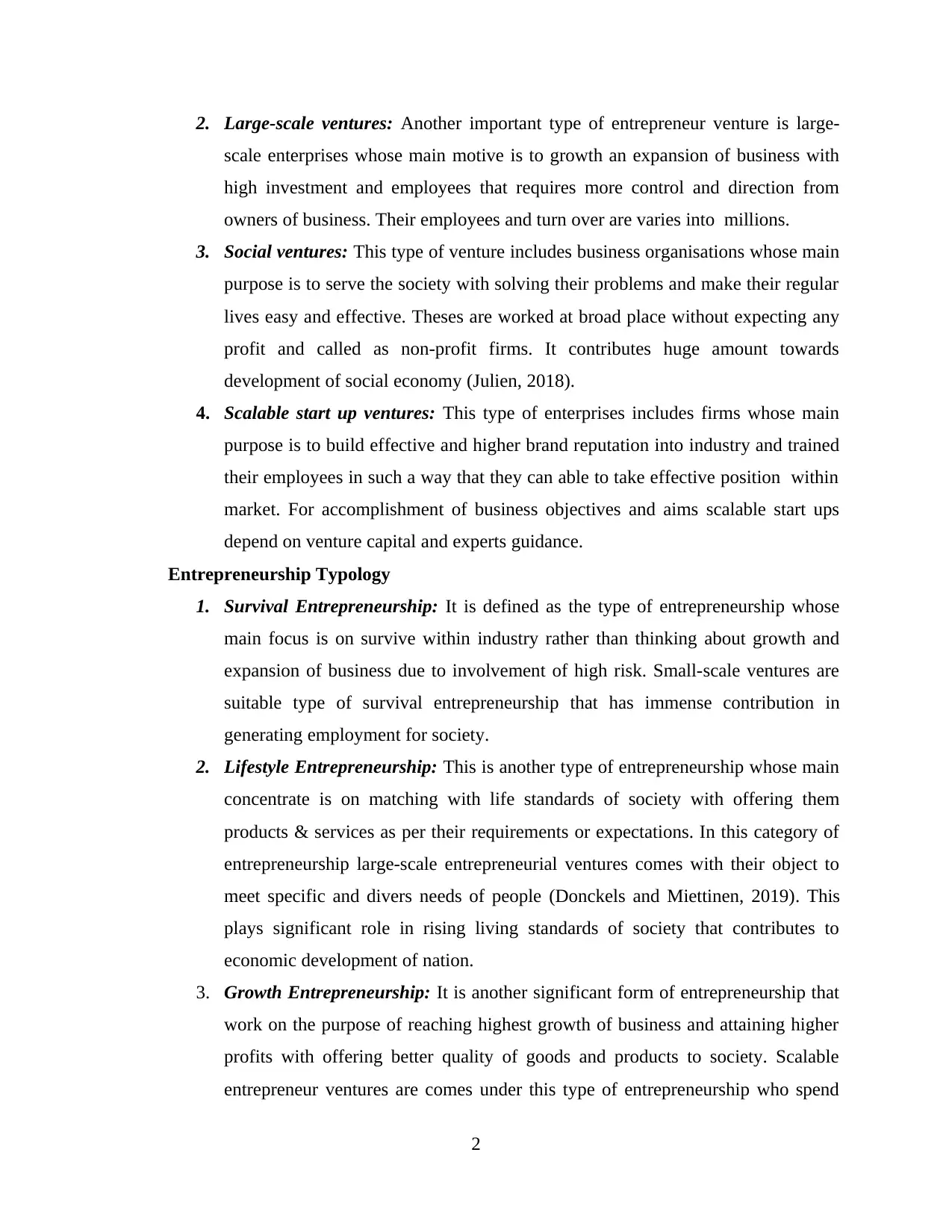
2. Large-scale ventures: Another important type of entrepreneur venture is large-
scale enterprises whose main motive is to growth an expansion of business with
high investment and employees that requires more control and direction from
owners of business. Their employees and turn over are varies into millions.
3. Social ventures: This type of venture includes business organisations whose main
purpose is to serve the society with solving their problems and make their regular
lives easy and effective. Theses are worked at broad place without expecting any
profit and called as non-profit firms. It contributes huge amount towards
development of social economy (Julien, 2018).
4. Scalable start up ventures: This type of enterprises includes firms whose main
purpose is to build effective and higher brand reputation into industry and trained
their employees in such a way that they can able to take effective position within
market. For accomplishment of business objectives and aims scalable start ups
depend on venture capital and experts guidance.
Entrepreneurship Typology
1. Survival Entrepreneurship: It is defined as the type of entrepreneurship whose
main focus is on survive within industry rather than thinking about growth and
expansion of business due to involvement of high risk. Small-scale ventures are
suitable type of survival entrepreneurship that has immense contribution in
generating employment for society.
2. Lifestyle Entrepreneurship: This is another type of entrepreneurship whose main
concentrate is on matching with life standards of society with offering them
products & services as per their requirements or expectations. In this category of
entrepreneurship large-scale entrepreneurial ventures comes with their object to
meet specific and divers needs of people (Donckels and Miettinen, 2019). This
plays significant role in rising living standards of society that contributes to
economic development of nation.
3. Growth Entrepreneurship: It is another significant form of entrepreneurship that
work on the purpose of reaching highest growth of business and attaining higher
profits with offering better quality of goods and products to society. Scalable
entrepreneur ventures are comes under this type of entrepreneurship who spend
2
scale enterprises whose main motive is to growth an expansion of business with
high investment and employees that requires more control and direction from
owners of business. Their employees and turn over are varies into millions.
3. Social ventures: This type of venture includes business organisations whose main
purpose is to serve the society with solving their problems and make their regular
lives easy and effective. Theses are worked at broad place without expecting any
profit and called as non-profit firms. It contributes huge amount towards
development of social economy (Julien, 2018).
4. Scalable start up ventures: This type of enterprises includes firms whose main
purpose is to build effective and higher brand reputation into industry and trained
their employees in such a way that they can able to take effective position within
market. For accomplishment of business objectives and aims scalable start ups
depend on venture capital and experts guidance.
Entrepreneurship Typology
1. Survival Entrepreneurship: It is defined as the type of entrepreneurship whose
main focus is on survive within industry rather than thinking about growth and
expansion of business due to involvement of high risk. Small-scale ventures are
suitable type of survival entrepreneurship that has immense contribution in
generating employment for society.
2. Lifestyle Entrepreneurship: This is another type of entrepreneurship whose main
concentrate is on matching with life standards of society with offering them
products & services as per their requirements or expectations. In this category of
entrepreneurship large-scale entrepreneurial ventures comes with their object to
meet specific and divers needs of people (Donckels and Miettinen, 2019). This
plays significant role in rising living standards of society that contributes to
economic development of nation.
3. Growth Entrepreneurship: It is another significant form of entrepreneurship that
work on the purpose of reaching highest growth of business and attaining higher
profits with offering better quality of goods and products to society. Scalable
entrepreneur ventures are comes under this type of entrepreneurship who spend
2
Paraphrase This Document
Need a fresh take? Get an instant paraphrase of this document with our AI Paraphraser
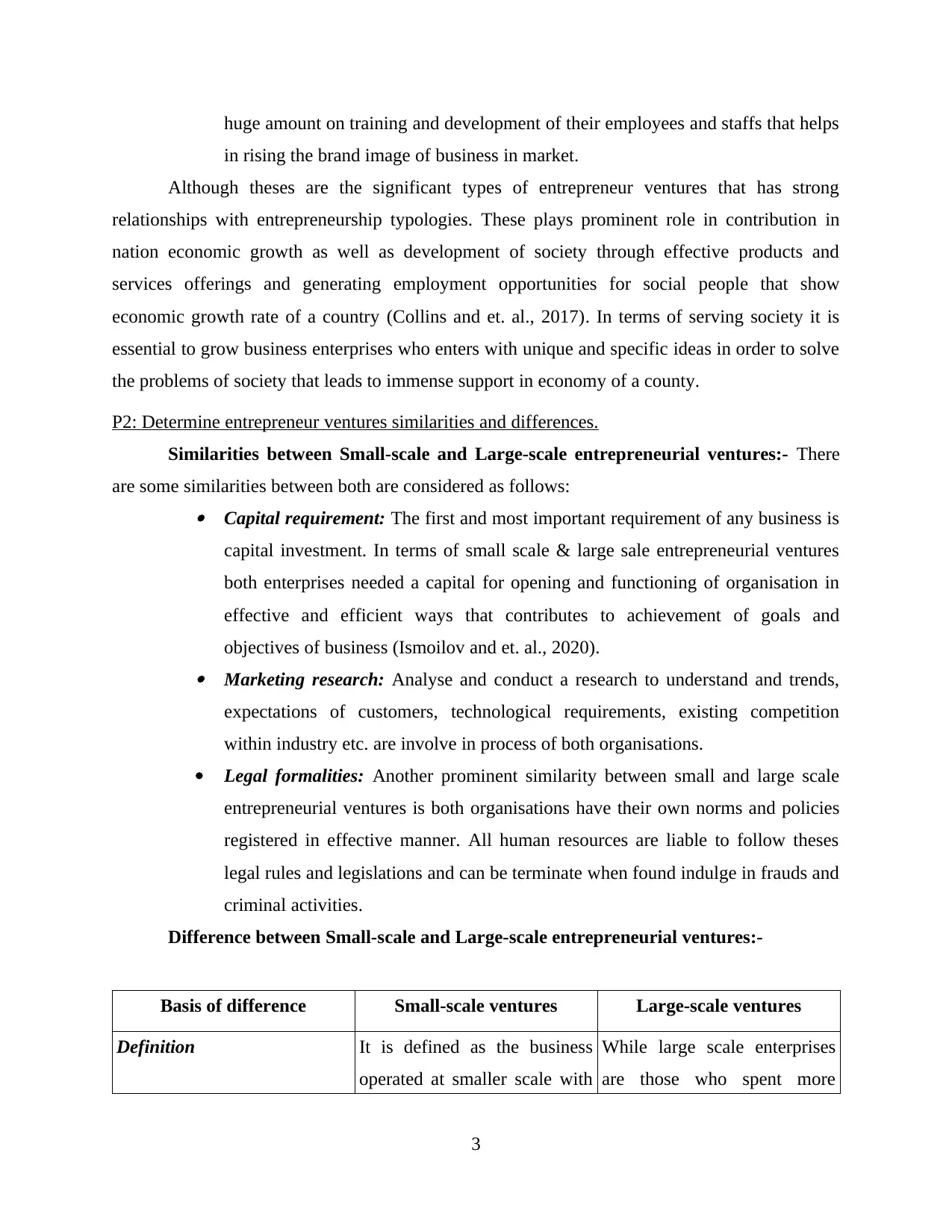
huge amount on training and development of their employees and staffs that helps
in rising the brand image of business in market.
Although theses are the significant types of entrepreneur ventures that has strong
relationships with entrepreneurship typologies. These plays prominent role in contribution in
nation economic growth as well as development of society through effective products and
services offerings and generating employment opportunities for social people that show
economic growth rate of a country (Collins and et. al., 2017). In terms of serving society it is
essential to grow business enterprises who enters with unique and specific ideas in order to solve
the problems of society that leads to immense support in economy of a county.
P2: Determine entrepreneur ventures similarities and differences.
Similarities between Small-scale and Large-scale entrepreneurial ventures:- There
are some similarities between both are considered as follows:
Capital requirement: The first and most important requirement of any business is
capital investment. In terms of small scale & large sale entrepreneurial ventures
both enterprises needed a capital for opening and functioning of organisation in
effective and efficient ways that contributes to achievement of goals and
objectives of business (Ismoilov and et. al., 2020).
Marketing research: Analyse and conduct a research to understand and trends,
expectations of customers, technological requirements, existing competition
within industry etc. are involve in process of both organisations.
Legal formalities: Another prominent similarity between small and large scale
entrepreneurial ventures is both organisations have their own norms and policies
registered in effective manner. All human resources are liable to follow theses
legal rules and legislations and can be terminate when found indulge in frauds and
criminal activities.
Difference between Small-scale and Large-scale entrepreneurial ventures:-
Basis of difference Small-scale ventures Large-scale ventures
Definition It is defined as the business
operated at smaller scale with
While large scale enterprises
are those who spent more
3
in rising the brand image of business in market.
Although theses are the significant types of entrepreneur ventures that has strong
relationships with entrepreneurship typologies. These plays prominent role in contribution in
nation economic growth as well as development of society through effective products and
services offerings and generating employment opportunities for social people that show
economic growth rate of a country (Collins and et. al., 2017). In terms of serving society it is
essential to grow business enterprises who enters with unique and specific ideas in order to solve
the problems of society that leads to immense support in economy of a county.
P2: Determine entrepreneur ventures similarities and differences.
Similarities between Small-scale and Large-scale entrepreneurial ventures:- There
are some similarities between both are considered as follows:
Capital requirement: The first and most important requirement of any business is
capital investment. In terms of small scale & large sale entrepreneurial ventures
both enterprises needed a capital for opening and functioning of organisation in
effective and efficient ways that contributes to achievement of goals and
objectives of business (Ismoilov and et. al., 2020).
Marketing research: Analyse and conduct a research to understand and trends,
expectations of customers, technological requirements, existing competition
within industry etc. are involve in process of both organisations.
Legal formalities: Another prominent similarity between small and large scale
entrepreneurial ventures is both organisations have their own norms and policies
registered in effective manner. All human resources are liable to follow theses
legal rules and legislations and can be terminate when found indulge in frauds and
criminal activities.
Difference between Small-scale and Large-scale entrepreneurial ventures:-
Basis of difference Small-scale ventures Large-scale ventures
Definition It is defined as the business
operated at smaller scale with
While large scale enterprises
are those who spent more
3
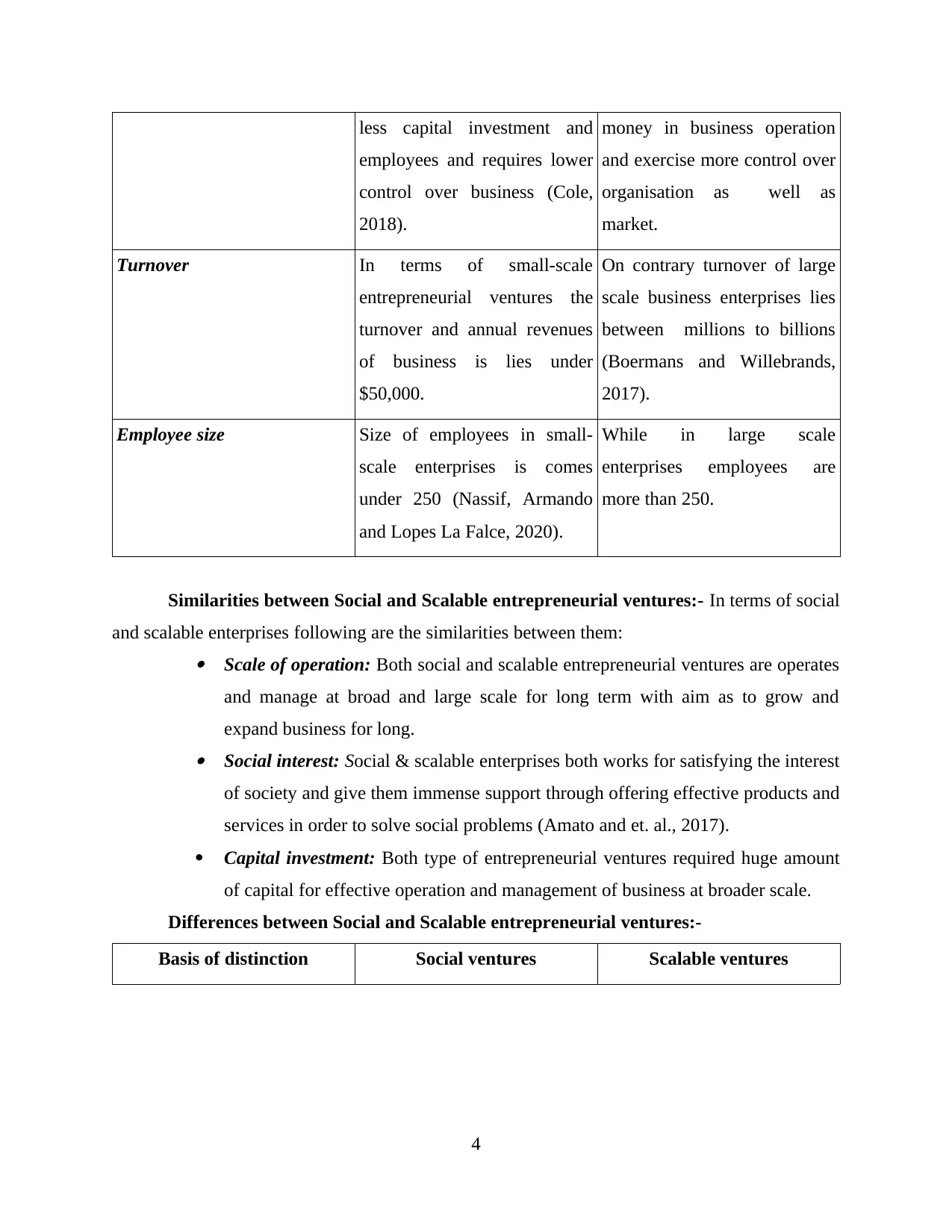
less capital investment and
employees and requires lower
control over business (Cole,
2018).
money in business operation
and exercise more control over
organisation as well as
market.
Turnover In terms of small-scale
entrepreneurial ventures the
turnover and annual revenues
of business is lies under
$50,000.
On contrary turnover of large
scale business enterprises lies
between millions to billions
(Boermans and Willebrands,
2017).
Employee size Size of employees in small-
scale enterprises is comes
under 250 (Nassif, Armando
and Lopes La Falce, 2020).
While in large scale
enterprises employees are
more than 250.
Similarities between Social and Scalable entrepreneurial ventures:- In terms of social
and scalable enterprises following are the similarities between them:
Scale of operation: Both social and scalable entrepreneurial ventures are operates
and manage at broad and large scale for long term with aim as to grow and
expand business for long.
Social interest: Social & scalable enterprises both works for satisfying the interest
of society and give them immense support through offering effective products and
services in order to solve social problems (Amato and et. al., 2017).
Capital investment: Both type of entrepreneurial ventures required huge amount
of capital for effective operation and management of business at broader scale.
Differences between Social and Scalable entrepreneurial ventures:-
Basis of distinction Social ventures Scalable ventures
4
employees and requires lower
control over business (Cole,
2018).
money in business operation
and exercise more control over
organisation as well as
market.
Turnover In terms of small-scale
entrepreneurial ventures the
turnover and annual revenues
of business is lies under
$50,000.
On contrary turnover of large
scale business enterprises lies
between millions to billions
(Boermans and Willebrands,
2017).
Employee size Size of employees in small-
scale enterprises is comes
under 250 (Nassif, Armando
and Lopes La Falce, 2020).
While in large scale
enterprises employees are
more than 250.
Similarities between Social and Scalable entrepreneurial ventures:- In terms of social
and scalable enterprises following are the similarities between them:
Scale of operation: Both social and scalable entrepreneurial ventures are operates
and manage at broad and large scale for long term with aim as to grow and
expand business for long.
Social interest: Social & scalable enterprises both works for satisfying the interest
of society and give them immense support through offering effective products and
services in order to solve social problems (Amato and et. al., 2017).
Capital investment: Both type of entrepreneurial ventures required huge amount
of capital for effective operation and management of business at broader scale.
Differences between Social and Scalable entrepreneurial ventures:-
Basis of distinction Social ventures Scalable ventures
4
⊘ This is a preview!⊘
Do you want full access?
Subscribe today to unlock all pages.

Trusted by 1+ million students worldwide
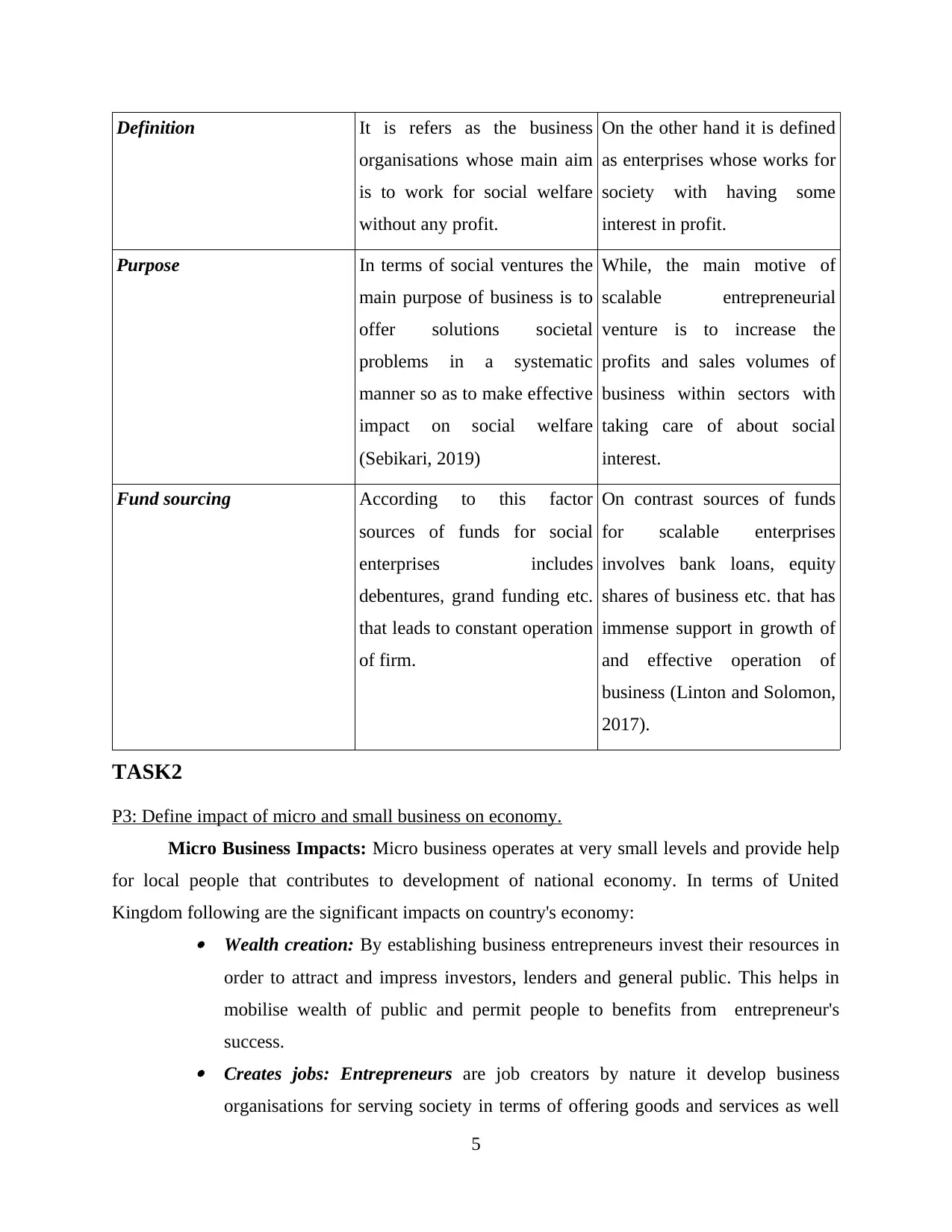
Definition It is refers as the business
organisations whose main aim
is to work for social welfare
without any profit.
On the other hand it is defined
as enterprises whose works for
society with having some
interest in profit.
Purpose In terms of social ventures the
main purpose of business is to
offer solutions societal
problems in a systematic
manner so as to make effective
impact on social welfare
(Sebikari, 2019)
While, the main motive of
scalable entrepreneurial
venture is to increase the
profits and sales volumes of
business within sectors with
taking care of about social
interest.
Fund sourcing According to this factor
sources of funds for social
enterprises includes
debentures, grand funding etc.
that leads to constant operation
of firm.
On contrast sources of funds
for scalable enterprises
involves bank loans, equity
shares of business etc. that has
immense support in growth of
and effective operation of
business (Linton and Solomon,
2017).
TASK2
P3: Define impact of micro and small business on economy.
Micro Business Impacts: Micro business operates at very small levels and provide help
for local people that contributes to development of national economy. In terms of United
Kingdom following are the significant impacts on country's economy:
Wealth creation: By establishing business entrepreneurs invest their resources in
order to attract and impress investors, lenders and general public. This helps in
mobilise wealth of public and permit people to benefits from entrepreneur's
success.
Creates jobs: Entrepreneurs are job creators by nature it develop business
organisations for serving society in terms of offering goods and services as well
5
organisations whose main aim
is to work for social welfare
without any profit.
On the other hand it is defined
as enterprises whose works for
society with having some
interest in profit.
Purpose In terms of social ventures the
main purpose of business is to
offer solutions societal
problems in a systematic
manner so as to make effective
impact on social welfare
(Sebikari, 2019)
While, the main motive of
scalable entrepreneurial
venture is to increase the
profits and sales volumes of
business within sectors with
taking care of about social
interest.
Fund sourcing According to this factor
sources of funds for social
enterprises includes
debentures, grand funding etc.
that leads to constant operation
of firm.
On contrast sources of funds
for scalable enterprises
involves bank loans, equity
shares of business etc. that has
immense support in growth of
and effective operation of
business (Linton and Solomon,
2017).
TASK2
P3: Define impact of micro and small business on economy.
Micro Business Impacts: Micro business operates at very small levels and provide help
for local people that contributes to development of national economy. In terms of United
Kingdom following are the significant impacts on country's economy:
Wealth creation: By establishing business entrepreneurs invest their resources in
order to attract and impress investors, lenders and general public. This helps in
mobilise wealth of public and permit people to benefits from entrepreneur's
success.
Creates jobs: Entrepreneurs are job creators by nature it develop business
organisations for serving society in terms of offering goods and services as well
5
Paraphrase This Document
Need a fresh take? Get an instant paraphrase of this document with our AI Paraphraser
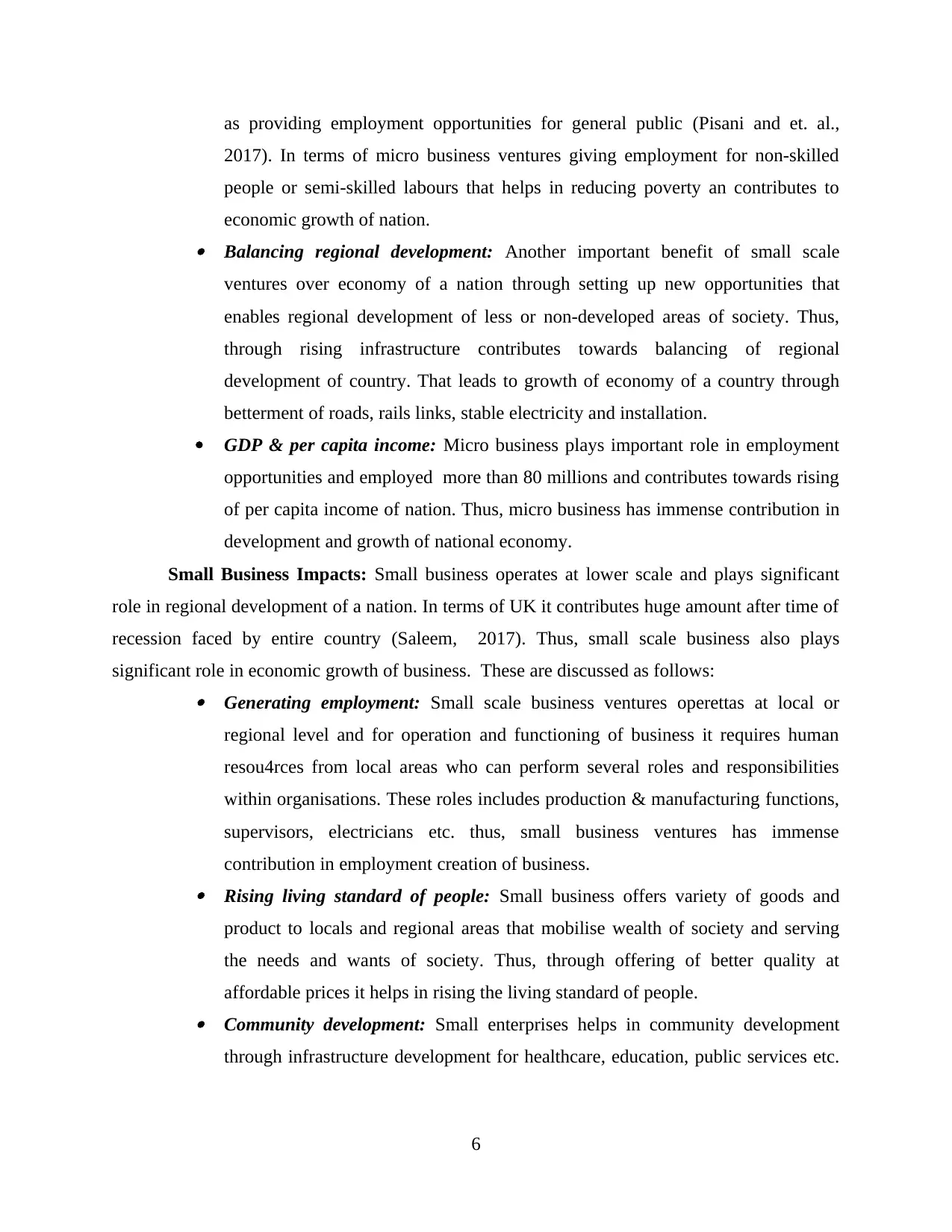
as providing employment opportunities for general public (Pisani and et. al.,
2017). In terms of micro business ventures giving employment for non-skilled
people or semi-skilled labours that helps in reducing poverty an contributes to
economic growth of nation.
Balancing regional development: Another important benefit of small scale
ventures over economy of a nation through setting up new opportunities that
enables regional development of less or non-developed areas of society. Thus,
through rising infrastructure contributes towards balancing of regional
development of country. That leads to growth of economy of a country through
betterment of roads, rails links, stable electricity and installation.
GDP & per capita income: Micro business plays important role in employment
opportunities and employed more than 80 millions and contributes towards rising
of per capita income of nation. Thus, micro business has immense contribution in
development and growth of national economy.
Small Business Impacts: Small business operates at lower scale and plays significant
role in regional development of a nation. In terms of UK it contributes huge amount after time of
recession faced by entire country (Saleem, 2017). Thus, small scale business also plays
significant role in economic growth of business. These are discussed as follows:
Generating employment: Small scale business ventures operettas at local or
regional level and for operation and functioning of business it requires human
resou4rces from local areas who can perform several roles and responsibilities
within organisations. These roles includes production & manufacturing functions,
supervisors, electricians etc. thus, small business ventures has immense
contribution in employment creation of business.
Rising living standard of people: Small business offers variety of goods and
product to locals and regional areas that mobilise wealth of society and serving
the needs and wants of society. Thus, through offering of better quality at
affordable prices it helps in rising the living standard of people.
Community development: Small enterprises helps in community development
through infrastructure development for healthcare, education, public services etc.
6
2017). In terms of micro business ventures giving employment for non-skilled
people or semi-skilled labours that helps in reducing poverty an contributes to
economic growth of nation.
Balancing regional development: Another important benefit of small scale
ventures over economy of a nation through setting up new opportunities that
enables regional development of less or non-developed areas of society. Thus,
through rising infrastructure contributes towards balancing of regional
development of country. That leads to growth of economy of a country through
betterment of roads, rails links, stable electricity and installation.
GDP & per capita income: Micro business plays important role in employment
opportunities and employed more than 80 millions and contributes towards rising
of per capita income of nation. Thus, micro business has immense contribution in
development and growth of national economy.
Small Business Impacts: Small business operates at lower scale and plays significant
role in regional development of a nation. In terms of UK it contributes huge amount after time of
recession faced by entire country (Saleem, 2017). Thus, small scale business also plays
significant role in economic growth of business. These are discussed as follows:
Generating employment: Small scale business ventures operettas at local or
regional level and for operation and functioning of business it requires human
resou4rces from local areas who can perform several roles and responsibilities
within organisations. These roles includes production & manufacturing functions,
supervisors, electricians etc. thus, small business ventures has immense
contribution in employment creation of business.
Rising living standard of people: Small business offers variety of goods and
product to locals and regional areas that mobilise wealth of society and serving
the needs and wants of society. Thus, through offering of better quality at
affordable prices it helps in rising the living standard of people.
Community development: Small enterprises helps in community development
through infrastructure development for healthcare, education, public services etc.
6
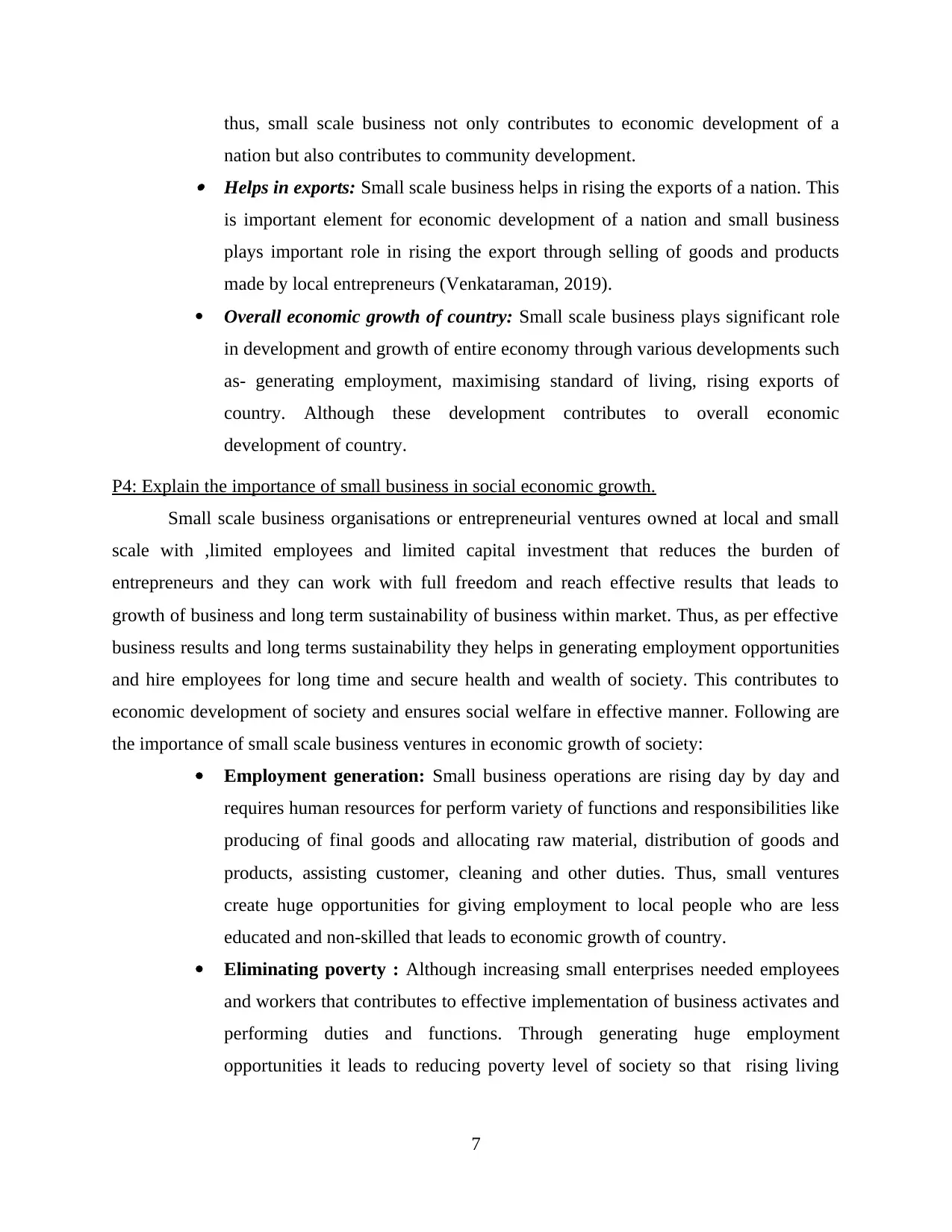
thus, small scale business not only contributes to economic development of a
nation but also contributes to community development.
Helps in exports: Small scale business helps in rising the exports of a nation. This
is important element for economic development of a nation and small business
plays important role in rising the export through selling of goods and products
made by local entrepreneurs (Venkataraman, 2019).
Overall economic growth of country: Small scale business plays significant role
in development and growth of entire economy through various developments such
as- generating employment, maximising standard of living, rising exports of
country. Although these development contributes to overall economic
development of country.
P4: Explain the importance of small business in social economic growth.
Small scale business organisations or entrepreneurial ventures owned at local and small
scale with ,limited employees and limited capital investment that reduces the burden of
entrepreneurs and they can work with full freedom and reach effective results that leads to
growth of business and long term sustainability of business within market. Thus, as per effective
business results and long terms sustainability they helps in generating employment opportunities
and hire employees for long time and secure health and wealth of society. This contributes to
economic development of society and ensures social welfare in effective manner. Following are
the importance of small scale business ventures in economic growth of society:
Employment generation: Small business operations are rising day by day and
requires human resources for perform variety of functions and responsibilities like
producing of final goods and allocating raw material, distribution of goods and
products, assisting customer, cleaning and other duties. Thus, small ventures
create huge opportunities for giving employment to local people who are less
educated and non-skilled that leads to economic growth of country.
Eliminating poverty : Although increasing small enterprises needed employees
and workers that contributes to effective implementation of business activates and
performing duties and functions. Through generating huge employment
opportunities it leads to reducing poverty level of society so that rising living
7
nation but also contributes to community development.
Helps in exports: Small scale business helps in rising the exports of a nation. This
is important element for economic development of a nation and small business
plays important role in rising the export through selling of goods and products
made by local entrepreneurs (Venkataraman, 2019).
Overall economic growth of country: Small scale business plays significant role
in development and growth of entire economy through various developments such
as- generating employment, maximising standard of living, rising exports of
country. Although these development contributes to overall economic
development of country.
P4: Explain the importance of small business in social economic growth.
Small scale business organisations or entrepreneurial ventures owned at local and small
scale with ,limited employees and limited capital investment that reduces the burden of
entrepreneurs and they can work with full freedom and reach effective results that leads to
growth of business and long term sustainability of business within market. Thus, as per effective
business results and long terms sustainability they helps in generating employment opportunities
and hire employees for long time and secure health and wealth of society. This contributes to
economic development of society and ensures social welfare in effective manner. Following are
the importance of small scale business ventures in economic growth of society:
Employment generation: Small business operations are rising day by day and
requires human resources for perform variety of functions and responsibilities like
producing of final goods and allocating raw material, distribution of goods and
products, assisting customer, cleaning and other duties. Thus, small ventures
create huge opportunities for giving employment to local people who are less
educated and non-skilled that leads to economic growth of country.
Eliminating poverty : Although increasing small enterprises needed employees
and workers that contributes to effective implementation of business activates and
performing duties and functions. Through generating huge employment
opportunities it leads to reducing poverty level of society so that rising living
7
⊘ This is a preview!⊘
Do you want full access?
Subscribe today to unlock all pages.

Trusted by 1+ million students worldwide
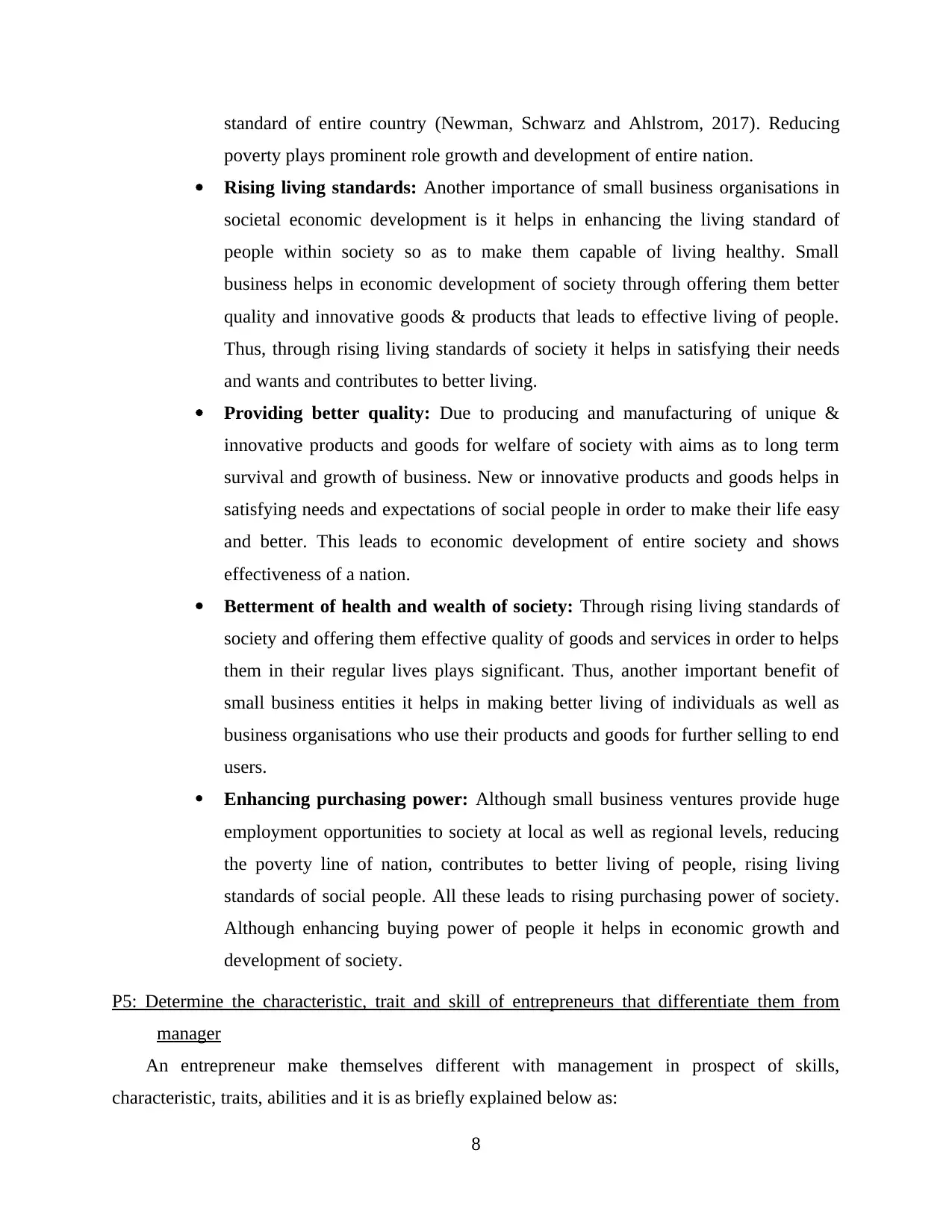
standard of entire country (Newman, Schwarz and Ahlstrom, 2017). Reducing
poverty plays prominent role growth and development of entire nation.
Rising living standards: Another importance of small business organisations in
societal economic development is it helps in enhancing the living standard of
people within society so as to make them capable of living healthy. Small
business helps in economic development of society through offering them better
quality and innovative goods & products that leads to effective living of people.
Thus, through rising living standards of society it helps in satisfying their needs
and wants and contributes to better living.
Providing better quality: Due to producing and manufacturing of unique &
innovative products and goods for welfare of society with aims as to long term
survival and growth of business. New or innovative products and goods helps in
satisfying needs and expectations of social people in order to make their life easy
and better. This leads to economic development of entire society and shows
effectiveness of a nation.
Betterment of health and wealth of society: Through rising living standards of
society and offering them effective quality of goods and services in order to helps
them in their regular lives plays significant. Thus, another important benefit of
small business entities it helps in making better living of individuals as well as
business organisations who use their products and goods for further selling to end
users.
Enhancing purchasing power: Although small business ventures provide huge
employment opportunities to society at local as well as regional levels, reducing
the poverty line of nation, contributes to better living of people, rising living
standards of social people. All these leads to rising purchasing power of society.
Although enhancing buying power of people it helps in economic growth and
development of society.
P5: Determine the characteristic, trait and skill of entrepreneurs that differentiate them from
manager
An entrepreneur make themselves different with management in prospect of skills,
characteristic, traits, abilities and it is as briefly explained below as:
8
poverty plays prominent role growth and development of entire nation.
Rising living standards: Another importance of small business organisations in
societal economic development is it helps in enhancing the living standard of
people within society so as to make them capable of living healthy. Small
business helps in economic development of society through offering them better
quality and innovative goods & products that leads to effective living of people.
Thus, through rising living standards of society it helps in satisfying their needs
and wants and contributes to better living.
Providing better quality: Due to producing and manufacturing of unique &
innovative products and goods for welfare of society with aims as to long term
survival and growth of business. New or innovative products and goods helps in
satisfying needs and expectations of social people in order to make their life easy
and better. This leads to economic development of entire society and shows
effectiveness of a nation.
Betterment of health and wealth of society: Through rising living standards of
society and offering them effective quality of goods and services in order to helps
them in their regular lives plays significant. Thus, another important benefit of
small business entities it helps in making better living of individuals as well as
business organisations who use their products and goods for further selling to end
users.
Enhancing purchasing power: Although small business ventures provide huge
employment opportunities to society at local as well as regional levels, reducing
the poverty line of nation, contributes to better living of people, rising living
standards of social people. All these leads to rising purchasing power of society.
Although enhancing buying power of people it helps in economic growth and
development of society.
P5: Determine the characteristic, trait and skill of entrepreneurs that differentiate them from
manager
An entrepreneur make themselves different with management in prospect of skills,
characteristic, traits, abilities and it is as briefly explained below as:
8
Paraphrase This Document
Need a fresh take? Get an instant paraphrase of this document with our AI Paraphraser
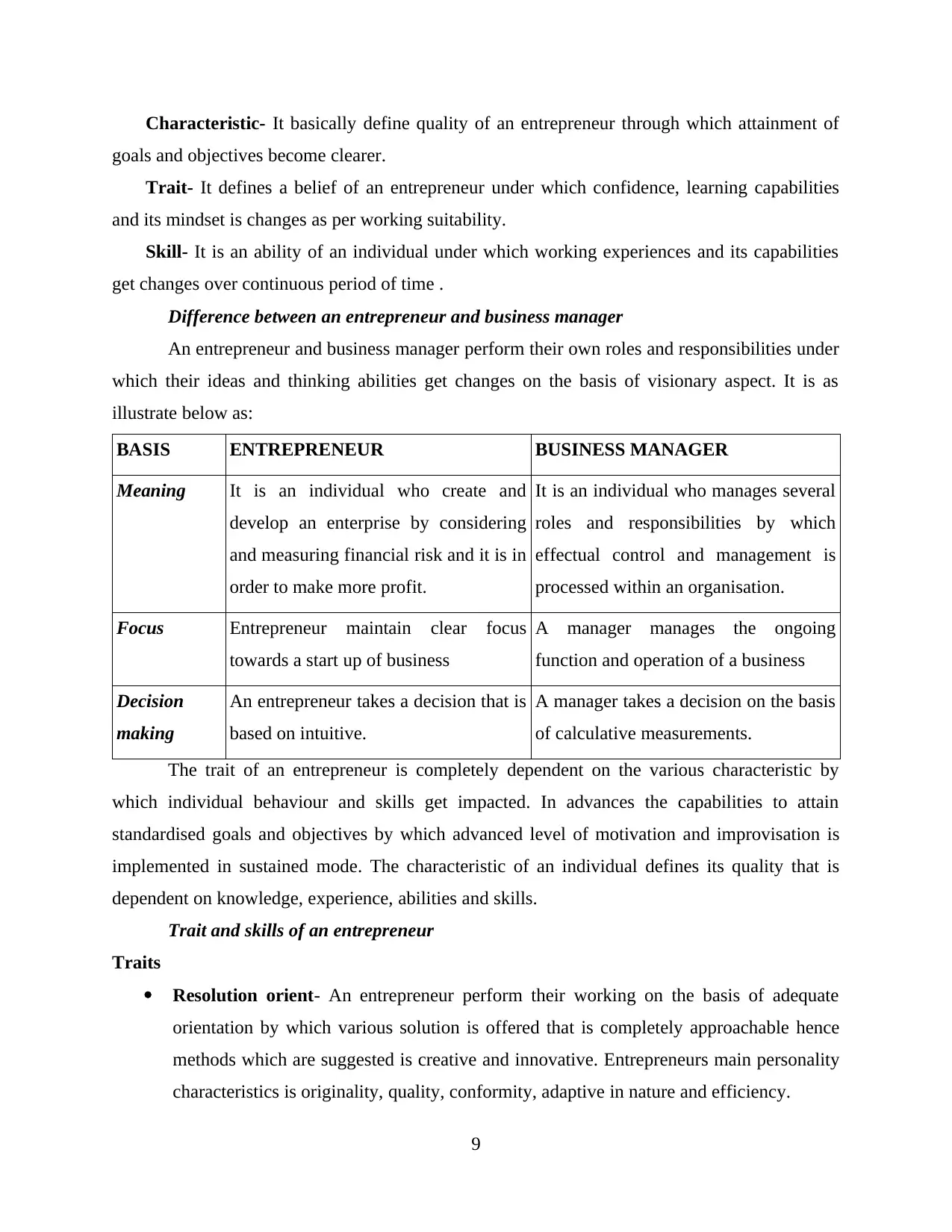
Characteristic- It basically define quality of an entrepreneur through which attainment of
goals and objectives become clearer.
Trait- It defines a belief of an entrepreneur under which confidence, learning capabilities
and its mindset is changes as per working suitability.
Skill- It is an ability of an individual under which working experiences and its capabilities
get changes over continuous period of time .
Difference between an entrepreneur and business manager
An entrepreneur and business manager perform their own roles and responsibilities under
which their ideas and thinking abilities get changes on the basis of visionary aspect. It is as
illustrate below as:
BASIS ENTREPRENEUR BUSINESS MANAGER
Meaning It is an individual who create and
develop an enterprise by considering
and measuring financial risk and it is in
order to make more profit.
It is an individual who manages several
roles and responsibilities by which
effectual control and management is
processed within an organisation.
Focus Entrepreneur maintain clear focus
towards a start up of business
A manager manages the ongoing
function and operation of a business
Decision
making
An entrepreneur takes a decision that is
based on intuitive.
A manager takes a decision on the basis
of calculative measurements.
The trait of an entrepreneur is completely dependent on the various characteristic by
which individual behaviour and skills get impacted. In advances the capabilities to attain
standardised goals and objectives by which advanced level of motivation and improvisation is
implemented in sustained mode. The characteristic of an individual defines its quality that is
dependent on knowledge, experience, abilities and skills.
Trait and skills of an entrepreneur
Traits
Resolution orient- An entrepreneur perform their working on the basis of adequate
orientation by which various solution is offered that is completely approachable hence
methods which are suggested is creative and innovative. Entrepreneurs main personality
characteristics is originality, quality, conformity, adaptive in nature and efficiency.
9
goals and objectives become clearer.
Trait- It defines a belief of an entrepreneur under which confidence, learning capabilities
and its mindset is changes as per working suitability.
Skill- It is an ability of an individual under which working experiences and its capabilities
get changes over continuous period of time .
Difference between an entrepreneur and business manager
An entrepreneur and business manager perform their own roles and responsibilities under
which their ideas and thinking abilities get changes on the basis of visionary aspect. It is as
illustrate below as:
BASIS ENTREPRENEUR BUSINESS MANAGER
Meaning It is an individual who create and
develop an enterprise by considering
and measuring financial risk and it is in
order to make more profit.
It is an individual who manages several
roles and responsibilities by which
effectual control and management is
processed within an organisation.
Focus Entrepreneur maintain clear focus
towards a start up of business
A manager manages the ongoing
function and operation of a business
Decision
making
An entrepreneur takes a decision that is
based on intuitive.
A manager takes a decision on the basis
of calculative measurements.
The trait of an entrepreneur is completely dependent on the various characteristic by
which individual behaviour and skills get impacted. In advances the capabilities to attain
standardised goals and objectives by which advanced level of motivation and improvisation is
implemented in sustained mode. The characteristic of an individual defines its quality that is
dependent on knowledge, experience, abilities and skills.
Trait and skills of an entrepreneur
Traits
Resolution orient- An entrepreneur perform their working on the basis of adequate
orientation by which various solution is offered that is completely approachable hence
methods which are suggested is creative and innovative. Entrepreneurs main personality
characteristics is originality, quality, conformity, adaptive in nature and efficiency.
9
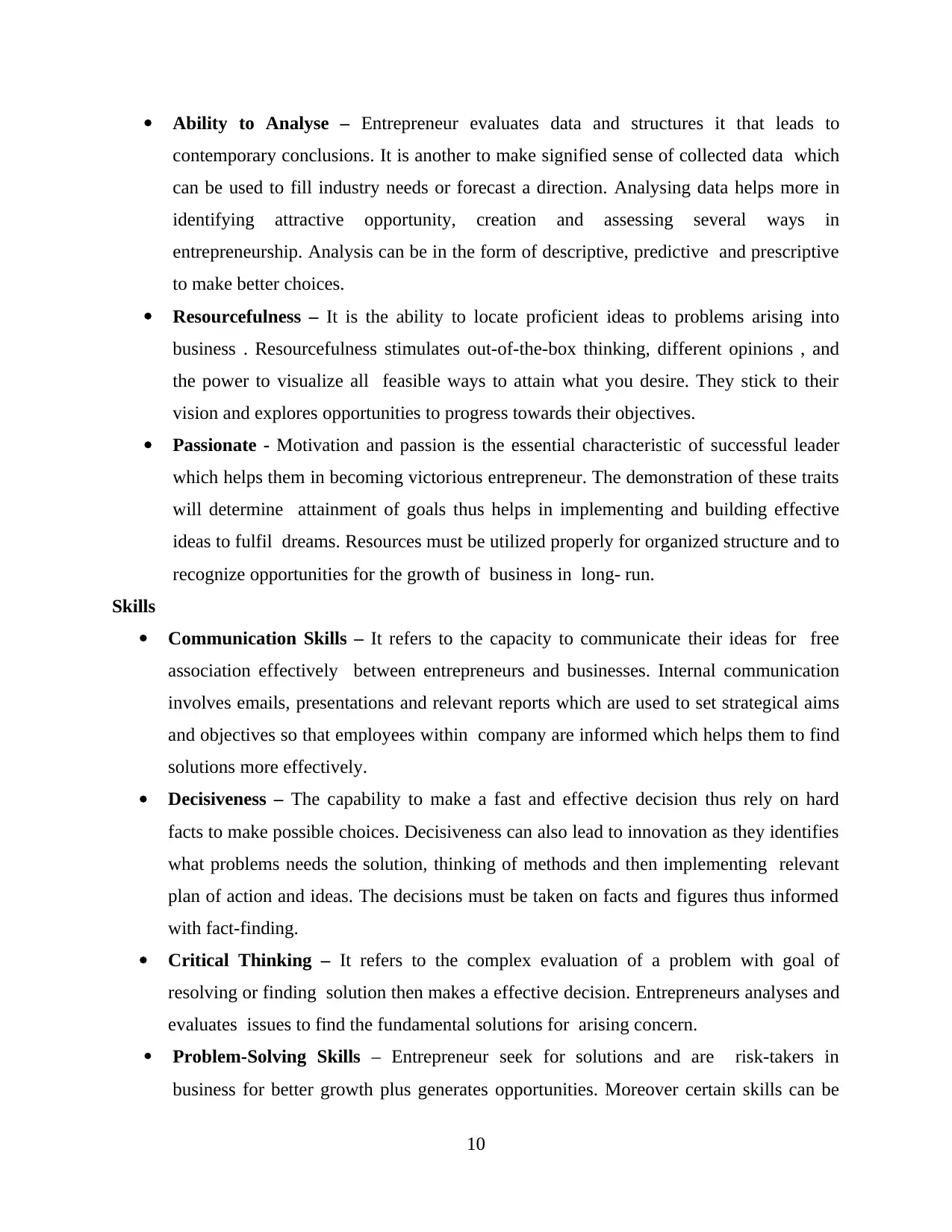
Ability to Analyse – Entrepreneur evaluates data and structures it that leads to
contemporary conclusions. It is another to make signified sense of collected data which
can be used to fill industry needs or forecast a direction. Analysing data helps more in
identifying attractive opportunity, creation and assessing several ways in
entrepreneurship. Analysis can be in the form of descriptive, predictive and prescriptive
to make better choices.
Resourcefulness – It is the ability to locate proficient ideas to problems arising into
business . Resourcefulness stimulates out-of-the-box thinking, different opinions , and
the power to visualize all feasible ways to attain what you desire. They stick to their
vision and explores opportunities to progress towards their objectives.
Passionate - Motivation and passion is the essential characteristic of successful leader
which helps them in becoming victorious entrepreneur. The demonstration of these traits
will determine attainment of goals thus helps in implementing and building effective
ideas to fulfil dreams. Resources must be utilized properly for organized structure and to
recognize opportunities for the growth of business in long- run.
Skills
Communication Skills – It refers to the capacity to communicate their ideas for free
association effectively between entrepreneurs and businesses. Internal communication
involves emails, presentations and relevant reports which are used to set strategical aims
and objectives so that employees within company are informed which helps them to find
solutions more effectively.
Decisiveness – The capability to make a fast and effective decision thus rely on hard
facts to make possible choices. Decisiveness can also lead to innovation as they identifies
what problems needs the solution, thinking of methods and then implementing relevant
plan of action and ideas. The decisions must be taken on facts and figures thus informed
with fact-finding.
Critical Thinking – It refers to the complex evaluation of a problem with goal of
resolving or finding solution then makes a effective decision. Entrepreneurs analyses and
evaluates issues to find the fundamental solutions for arising concern.
Problem-Solving Skills – Entrepreneur seek for solutions and are risk-takers in
business for better growth plus generates opportunities. Moreover certain skills can be
10
contemporary conclusions. It is another to make signified sense of collected data which
can be used to fill industry needs or forecast a direction. Analysing data helps more in
identifying attractive opportunity, creation and assessing several ways in
entrepreneurship. Analysis can be in the form of descriptive, predictive and prescriptive
to make better choices.
Resourcefulness – It is the ability to locate proficient ideas to problems arising into
business . Resourcefulness stimulates out-of-the-box thinking, different opinions , and
the power to visualize all feasible ways to attain what you desire. They stick to their
vision and explores opportunities to progress towards their objectives.
Passionate - Motivation and passion is the essential characteristic of successful leader
which helps them in becoming victorious entrepreneur. The demonstration of these traits
will determine attainment of goals thus helps in implementing and building effective
ideas to fulfil dreams. Resources must be utilized properly for organized structure and to
recognize opportunities for the growth of business in long- run.
Skills
Communication Skills – It refers to the capacity to communicate their ideas for free
association effectively between entrepreneurs and businesses. Internal communication
involves emails, presentations and relevant reports which are used to set strategical aims
and objectives so that employees within company are informed which helps them to find
solutions more effectively.
Decisiveness – The capability to make a fast and effective decision thus rely on hard
facts to make possible choices. Decisiveness can also lead to innovation as they identifies
what problems needs the solution, thinking of methods and then implementing relevant
plan of action and ideas. The decisions must be taken on facts and figures thus informed
with fact-finding.
Critical Thinking – It refers to the complex evaluation of a problem with goal of
resolving or finding solution then makes a effective decision. Entrepreneurs analyses and
evaluates issues to find the fundamental solutions for arising concern.
Problem-Solving Skills – Entrepreneur seek for solutions and are risk-takers in
business for better growth plus generates opportunities. Moreover certain skills can be
10
⊘ This is a preview!⊘
Do you want full access?
Subscribe today to unlock all pages.

Trusted by 1+ million students worldwide
1 out of 18
Related Documents
Your All-in-One AI-Powered Toolkit for Academic Success.
+13062052269
info@desklib.com
Available 24*7 on WhatsApp / Email
![[object Object]](/_next/static/media/star-bottom.7253800d.svg)
Unlock your academic potential
Copyright © 2020–2026 A2Z Services. All Rights Reserved. Developed and managed by ZUCOL.


![Entrepreneurship and Small Business Impact Report - [University Name]](/_next/image/?url=https%3A%2F%2Fdesklib.com%2Fmedia%2Fimages%2Fwj%2Fd1f42599211847658d3fd556aa563fa5.jpg&w=256&q=75)


